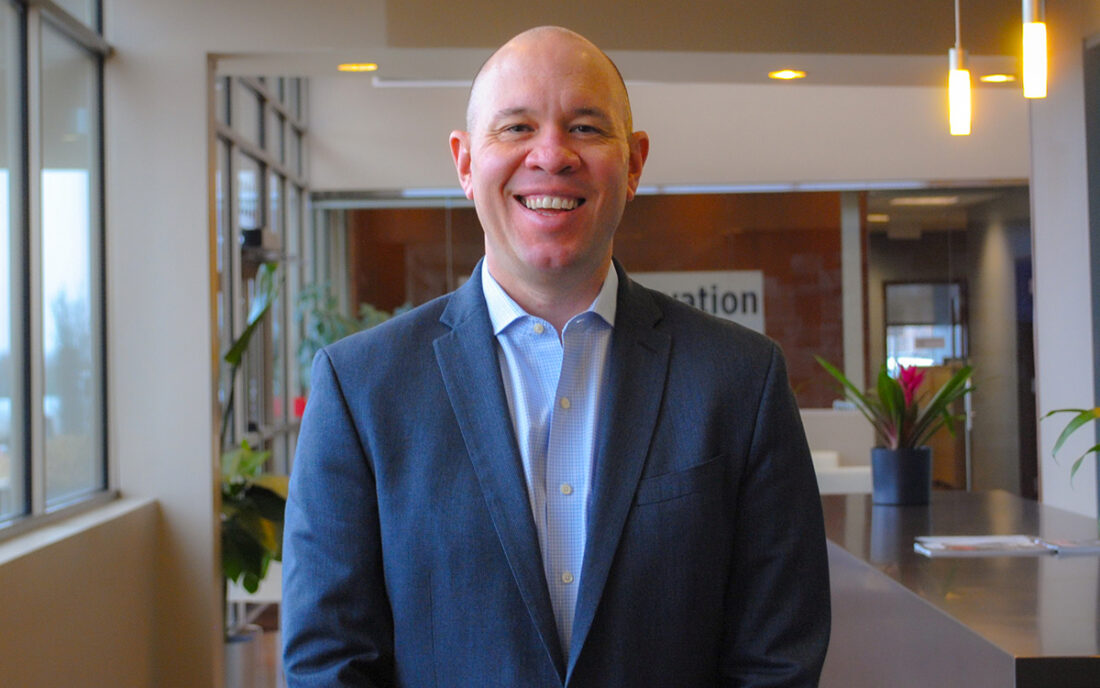
KU hires pair of executives who aim to convert research into new businesses; Delta Delta Delta files plans for $8.5M sorority house

photo by: Chad Lawhorn/Journal-World
KU Innovation Park's new research and office building opened to the public on Aug. 17, 2022.
Let’s do some news and notes from around town, with a crimson and blue tint.
• There’s another sign that the University of Kansas is serious about becoming a magnet for cybersecurity researchers and companies, and this latest one comes from Colorado.
KU Innovation Park — the business incubator and technology center on KU’s West Campus — has hired a former top executive of the University of Colorado who helped grow research and business development activities there, including a National Cybersecurity Center.
David Sprenger began earlier this month as KU Innovation Park’s executive vice president of business development. Sprenger spent 15 years at the University of Colorado, most recently as its associate vice president of federal and corporate relations.
When Sprenger began at Colorado, the university had a goal to become a national leader in the industry of cybersecurity. Sprenger said he knew so little about the topic then that he didn’t know if “cybersecurity” was one or two words.
“It sounded kind of crazy that we were going to be the national center for cybersecurity,” Sprenger recalled this week.
But the center in Colorado largely has grown into that role, taking a lead on national issues such as voter security. Now, as Sprenger begins at KU, he finds himself at a university that is looking to build its own presence in cybersecurity. That probably isn’t a coincidence.
“It is the same opportunity that I saw there that I see here,” Sprenger said.
KU currently is trying to raise money for an approximately $30 million West Campus project known as the Kansas National Security Innovation Center, which would focus on research related to cybersecurity and other innovations that could be used by the homeland security or defense industries.
Sprenger, in his role at Colorado, has talked with many of those types of businesses, plus many federal lawmakers who provide funding for that type of research.
“I’m hopeful some of that professional network I have pays dividends here,” Sprenger said.

photo by: Courtesy: KU
David Sprenger
Sprenger’s job at KU will go well beyond the area of cybersecurity, though. His job will involve working with a broad variety of companies that want to be located near KU researchers and students.
In its existing incubator/office buildings that KU Innovation Park already has constructed, there are about 600 employees from a mix of companies. Growing those numbers as KU grows its space at KU Innovation Park will be a big part of the job.
Sprenger told me he thought a big part of creating that type of success will be doing more to raise awareness — not just across the state, but also in Lawrence — of what KU Innovation Park is and what it has planned for the future.
“I keep hearing people say we are the best-kept secret in Lawrence,” he said. “We need to change that.”

photo by: Courtesy: KU
Clifford Michaels
• Some of the companies that someday may locate next to KU researchers may be companies actually founded by KU researchers. That’s a model that has occurred before, and KU now has a new leader working to make it happen more often.
Cliff Michaels earlier this week started as executive director of the KU Center for Technology Commercialization. The center assists KU researchers in figuring out whether their discoveries can be turned into businesses.
Michaels previously served as the assistant vice president for research and director of Georgia State University’s Office of Technology Transfer & Commercialization. Prior to that, he worked in Emory University’s Office of Technology Transfer.
As part of its announcement of Michaels’ hire, KU did share some interesting numbers related to research activity that produces potential products for commercialization. In the past five years, KU researchers have received 149 U.S. patents, and in 2022 there were 45 active companies that were in one form or another commercializing KU research discoveries. I have no idea how those numbers compare to other institutions, but they could be interesting metrics to follow in the future.
• Get ready for an $8.5 million project that may have more to do with rush than research. The KU chapter of the Delta Delta Delta sorority has filed plans at City Hall to build a new sorority house.
The plans call for the house to replace the existing Delta Delta Delta house at 1630 Oxford Road, which is a few blocks west of KU’s football stadium. The plans indicate the new building will be bigger, checking in at about 24,000 square feet spread over three floors. Douglas County property records indicate the current two-story sorority house is about 13,000 square feet.
I’m not sure how many sorority members live at the house currently, but the new plans call for enough rooms to house 72 occupants. The plans filed with the city are seeking a waiver from the city’s standard parking requirements. Plans call for 65 parking spaces, but city code requires 80 for the site. The city’s Board of Zoning Appeals will have to decide whether to grant the parking variance.
The plans anticipate construction starting this summer, if all approvals are granted. Here are a couple of renderings of the proposed building.

photo by: Courtesy: City of Lawrence/WPA Architecture
A rendering shows a proposed design for the Delta Delta Delta sorority house at 1630 Oxford Road.

photo by: Courtesy: City of Lawrence/WBA Architecture
A rendering shows the proposed design of the Delta Delta Delta sorority house at 1630 Oxford Road.







